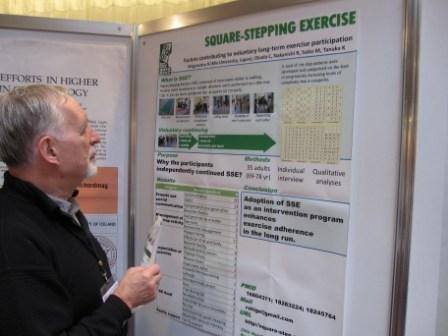Presentation, Iceland
One of our research group, Dr. Shigematsu, attended the 20th Nordic Congress of Gerontology in Reykjavík, Iceland (May 30 - June 2, 2010) and presented the research data.
The abstract was shown below.

To enjoy an active life, older adults require exercise. However, for many individuals, adherence to an exercise program is challenging. It is, therefore, important to determine the factors that contribute to long-term exercise participation amongst older adults. Participants were 35 individuals (19 female and 16 male), aged 69-78 years, who were physically independent. All of them had participated in our previous 3-month study and then had voluntarily continued exercising without our supervision for 4 years. The exercise mode was a square-stepping exercise (SSE) that we had developed as a means of physical fitness and cognitive training. Since the end of the previous study, the participants had continued the SSE protocol during weekly 90-minute group sessions. Each participant was interviewed individually regarding why he/she had remained in the exercise program. Each response was qualitatively analysed and then classified as “impetus” or “effect.” The impetuses included “to meet friends,” “to enjoy SSE,” and “to enjoy group dynamics.” The effects included “forming friendships,” “maintaining health,” and “preventing falls.” We found that these two major factors were interrelated and thus were both necessary for exercise adherence. Consequently, it is recommended that older adults exercise in a group; socialize before, during, and after the exercise session; routinely assess the effects of their exercise; and set rules for their group. These recommendations could help older adults continue exercising over prolonged periods. SSE appears to meet these recommendations and, therefore, participation in SSE may enhance exercise adherence.


